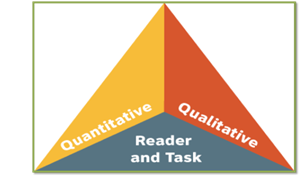Text Complexity and Text Selection
Selecting texts for adult learners involves:
- Analyzing text to ensure it is at the appropriate complexity level (based on diagnostic assessments of learners' reading levels)
- Ensuring that texts are appropriate for adults in topic and presentation
- Organizing texts in a unit or text set so that they work together to build background knowledge on a topic or develop understanding around a specific idea
Analyzing for Text Complexity
Text complexity refers to the cognitive challenge the text presents to the reader. The use of academic vocabulary, length and sophistication of sentences, the way paragraphs and sections are organized (structure), the clarity of the writing, and the knowledge demands are some of the factors that can impact text complexity.
Briefly, making decisions about text complexity incorporates three kinds of analysis:
- Quantitative Analysis: Use online tools to evaluate the quantitative features of a text, such as word- and sentence-length and vocabulary levels. These tools will help you assign a text to a level, using CCRSAE Reading Standard 10.
- Qualitative Analysis: Use a rubric to analyze the qualitative features that contribute to the complexity of a text. A qualitative analysis can help you assess features that aren't captured in a quantitative analysis (e.g., knowledge demands, text structure).
- Consideration of Reader and Task: Use your professional judgment to decide how suited the text is for this task (a specific instructional purpose) with these readers (i.e. the students in front of you, rather than generic students)
Appropriate Texts for Adult Learners
Care should be taken to ensure that texts chosen for a unit or lesson are appropriate for adults in topic and presentation. Visit the page below for a list of resources that can help you find level-appropriate texts for adult topics and interests.
Organizing Texts
Ideally, texts that students read in a unit should build off each other, gradually taking students deeper into the topic and exposing them to increasingly more complex vocabulary and ideas. It can be helpful to think of the texts in a unit working together as a text set.
Text Sets are curated and sequenced readings and resources, often with accompanying activities, that support learners in building knowledge on a specific topic over time.
 |
SABES ELA Curriculum Hub |
| SABES CCRSAE-ELA Hub | |
| SABES ELA Home Page |


